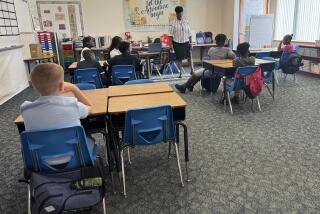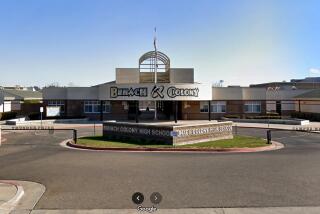Segregation Dispute Resolved by Principal’s Reassignment : Schools: District superintendent transfers longtime ABC employee to restore harmony among staff at Carver Elementary.
- Share via
ABC Unified School District officials have resolved a simmering dispute by transferring an elementary school principal who was accused this fall of creating segregated classes.
Starting in January, controversial Carver Elementary Principal Robert Beall will become the principal in charge of high school students with independent study programs--a newly created position in the district.
The transfer is “not an indictment of anyone,” Supt. Larry Lucas said. “We had a situation where parents and teachers were at odds with one another. . . . The problem was not necessarily what the decisions were, just that the people weren’t getting along.”
Beall could not be reached for comment. He went on sick leave shortly after Lucas announced the transfer earlier this month.
The dispute flared over Beall’s decision to place kindergarten students in classes based on test performance. The results created classes largely divided along ethnic lines.
At least one parent specifically accused Beall of racial segregation. Teachers at the Cerritos school also complained, arguing that kindergarten was too early to group students based on ability, said sources familiar with the dispute.
In September, district officials changed the composition of kindergarten classes to make them more ethnically balanced. Officials denied that there had ever been an intentional effort at segregation.
Lucas, who ordered Beall’s transfer, said the change was based on “no one incident or decision. It was the environment that developed.”
During the fall term, three of the school’s 24 teachers requested and received transfers before Lucas replaced Beall. “Healing needed to occur,” Lucas said. “We felt the transfer was in everyone’s best interest.”
One source likened the atmosphere at the school to “Hungary before the Cold War ended. I was meeting with people in closets. They were afraid. They distrusted each other.” At Carver, parents, teachers and administrators were beginning to take sides on even routine matters, the source added.
The district had long considered establishing a principal’s position to run its program for students who have left regular high school and need an individual study program, board member Jim Weisenberger said. Beall’s salary, about $62,000 a year, will remain unchanged.
The board voted to pay for the new post months after making controversial cuts to library, nursing and drug-education programs to balance the district budget.
Weisenberger said Beall’s new job will be funded from district reserves, which are for unexpected costs. “We’ve got a situation right now where we had to make some moves, so we felt this was the best and fairest way,” he said.
Beall will be replaced at Carver by Judi McEvers, principal at Kennedy Elementary in Artesia. McEvers’ assistant, Barbara Fields, will be acting principal at Kennedy until the district names a permanent replacement, probably in late February or March, Lucas said.
Associates describe Beall, who has been with the ABC district since it was formed in 1965, as a powerful, assertive administrator. “He had supporters, and like a lot of strong, aggressive people, he had enemies,” said one colleague, who asked not to be named. “He generates both passionate support and hatred.”
For more than a decade, Beall was principal of Whitney High School, the district’s school for selected academic achievers. Beall is given much credit for developing the Whitney program. For years, Beall had to fight off Whitney detractors who wanted to dismantle the program on grounds that it was elitist.
After leaving Whitney, Beall was in charge of obtaining grant money for the school system. He accepted the job as Carver principal in March, 1990.
Supt. Lucas praised Beall, 55, for starting an after-school enrichment program at Carver to push academics and fine arts. “He raised realistic expectations of what children can achieve,” Lucas said.
More to Read
Sign up for Essential California
The most important California stories and recommendations in your inbox every morning.
You may occasionally receive promotional content from the Los Angeles Times.














